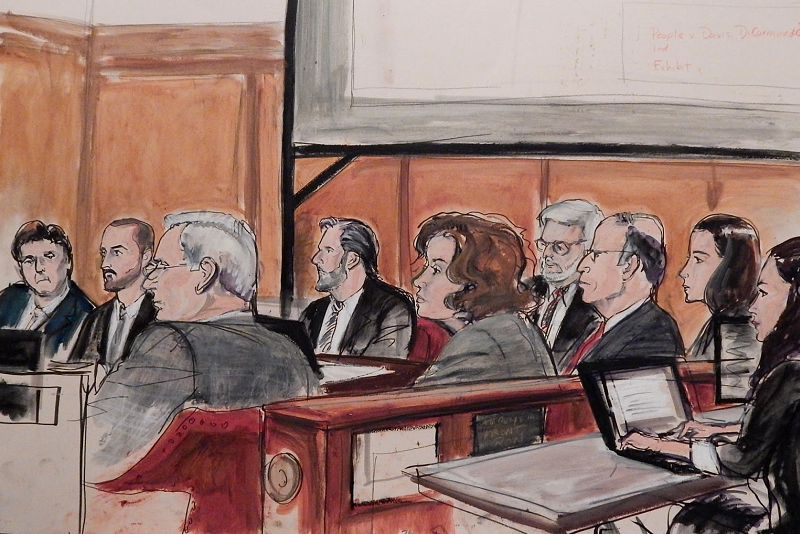BROWSE BY TOPIC
- Bad Brokers
- Compliance Concepts
- Investor Protection
- Investments - Unsuitable
- Investments - Strategies
- Investments - Private
- Features/Scandals
- Companies
- Technology/Internet
- Rules & Regulations
- Crimes
- Investments
- Bad Advisors
- Boiler Rooms
- Hirings/Transitions
- Terminations/Cost Cutting
- Regulators
- Wall Street News
- General News
- Donald Trump & Co.
- Lawsuits/Arbitrations
- Regulatory Sanctions
- Big Banks
- People
TRENDING TAGS
Stories of Interest
- Sarah ten Siethoff is New Associate Director of SEC Investment Management Rulemaking Office
- Catherine Keating Appointed CEO of BNY Mellon Wealth Management
- Credit Suisse to Pay $47Mn to Resolve DOJ Asia Probe
- SEC Chair Clayton Goes 'Hat in Hand' Before Congress on 2019 Budget Request
- SEC's Opening Remarks to the Elder Justice Coordinating Council
- Massachusetts Jury Convicts CA Attorney of Securities Fraud
- Deutsche Bank Says 3 Senior Investment Bankers to Leave Firm
- World’s Biggest Hedge Fund Reportedly ‘Bearish On Financial Assets’
- SEC Fines Constant Contact, Popular Email Marketer, for Overstating Subscriber Numbers
- SocGen Agrees to Pay $1.3 Billion to End Libya, Libor Probes
- Cryptocurrency Exchange Bitfinex Briefly Halts Trading After Cyber Attack
- SEC Names Valerie Szczepanik Senior Advisor for Digital Assets and Innovation
- SEC Modernizes Delivery of Fund Reports, Seeks Public Feedback on Improving Fund Disclosure
- NYSE Says SEC Plan to Limit Exchange Rebates Would Hurt Investors
- Deutsche Bank faces another challenge with Fed stress test
- Former JPMorgan Broker Files racial discrimination suit against company
- $3.3Mn Winning Bid for Lunch with Warren Buffett
- Julie Erhardt is SEC's New Acting Chief Risk Officer
- Chyhe Becker is SEC's New Acting Chief Economist, Acting Director of Economic and Risk Analysis Division
- Getting a Handle on Virtual Currencies - FINRA
ABOUT FINANCIALISH
We seek to provide information, insights and direction that may enable the Financial Community to effectively and efficiently operate in a regulatory risk-free environment by curating content from all over the web.
Stay Informed with the latest fanancialish news.
SUBSCRIBE FOR
NEWSLETTERS & ALERTS
Dewey and Its Downfall: A Timeline
[Illustration of Defense Table: Left to Right: Joel Sanders, defense counsel Cesar de Castro, Elkan Abramowiz ( foreground), Stephen DiCarmine, Jasmine Juteau,( foreground) , Austin Campriello, Steven Davis, Anne Redcross and Amanda Bassen (of Mr Sander's defense team.) -- by illustratedcourtroom.blogspot.com]
October 2007: Dewey Ballantine merges with LeBoeuf, Lamb, Greene & MacRae, a rare marriage of top New York law firms. At the time, the combined company had about 1,300 attorneys and annual revenue of close to $1 billion.
Late 2008: Because of weak financial performance, the firm is unable to meet the minimum year-end cash flow requirement set by its lenders. Executives are accused of devising a “Master Plan” by which they allegedly begin using improper accounting adjustments to create revenue and inflate net income.
2009: Financial performance continues to deteriorate, and executives seek a waiver from its lenders. Banks adjust terms, but additional conditions exert more financial pressure.
April 2010: Firm refinances its debt with $250 million from banks and insurance companies. The role of 3 former Dewey executives - Steven Davis, former chair; Stephen DiCarmine, former executive director, and Joel Sanders, former CFO - in securing the refinancing deal becomes a key part of the eventual fraud charges.
2012: Partner defections accelerate.
Spring 2012: Manhattan DA’s investigation into the firm’s practices becomes public. Meanwhile, merger talks with potential partners dry up.
May 2012: Dewey files for bankruptcy protection, the largest law firm failure in U.S. history. The firm owed $315 million to creditors.
March 2014: Criminal charges are brought against the 3 former Dewey executives, accusing them of fraud.
September 2015: Trial for the former executives concludes and goes to the jury.
Oct. 7, 2015: The jury delivers a partial verdict, finding each Dewey defendant not guilty on multiple charges of falsifying business records but remaining deadlocked on more than 100 charges against the trio.
Oct. 13, 2015: Jury clears the former law firm executives of more counts but still needs to decide on more than 90 counts, including grand larceny.
Oct. 19, 2015: Judge declares mistrial.





